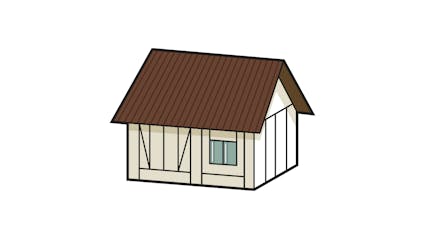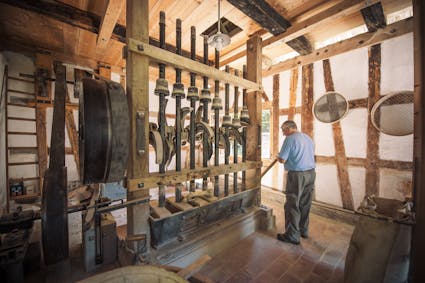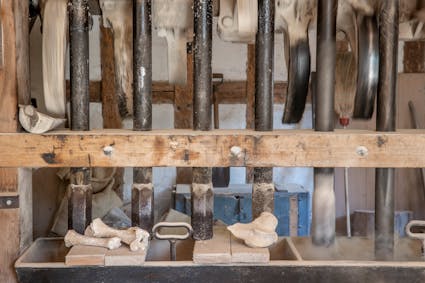692 – Bone Mill from Knonau ZH, 19th Century
The blows following one another in mere seconds crush the boiled bones until the catchment trough contains nothing but meal. It was used as fertiliser.

In Tact
The pounding machine is almost entirely made of cast iron. The waterwheel rotates a shaft with eight metal arms. They lift the heavy iron pins, which fall onto the boiled bones under their own weight. The blows following one another in mere seconds crush the boiled bones until the catchment trough contains nothing but meal.

Gradually Scrapped
The functional stone building with half timber gables and walls was built after 1800. It stood by the Hasel brook in the “im Grund” quarter of Knonau. The stamp mill inside comes from Bernese Heimisbach. The last bone mills shut down in the 1960’s. The Knonau mill probably closed shortly after 1900.
In 1970 the semi-detached house “Zur Stampfi ” to which the bone mill belonged burned down. The old neighbouring buildings had already been torn down and the unused derelict “Stampfi ’s” days were numbered. The demolition permit had already been granted when the Open-Air Museum took it over in 1984.

Bone Meal as Fertiliser
More than 100 years ago the chemical industry began to change the world with products such as paints and medication. Fertilisers for increasing crops could now, too, be artificially produced. But how had farmers managed to improve their harvests before? What plants need for growth are especially phosphorous, potassium and nitrogen. Muck (manure) as natural fertiliser contains these minerals. After 1780 bone meal, which contains 20 % phosphates, was also used.
Ballenberg
Swiss Open-Air Museum
Museumsstrasse 100
CH-3858 Hofstetten bei Brienz
Opening hours Administration
3 November 2025 to 8 April 2026
From Monday to Friday
8.30 am to 11.30 am
1.30 pm to 4.30 pm
Opening hours
9 April to 1 November 2026
10 am to 5 pm daily